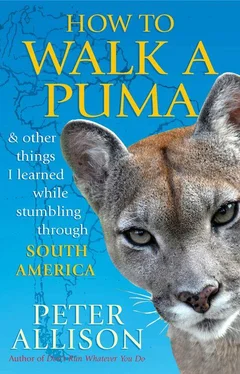‘Well, the day after you left,’ the email continued, ‘an anaconda was seen coiled right at the place you used to turn around. We couldn’t see how long it was because it was piled up, but one section was as thick as a thigh. That could easily take a man.’
‘Bugger,’ I thought. ‘An anaconda. Didn’t think of that one.’
A Month of Monkeys

Another of my adventures at Sacha occurred in the jungle.
It was all the monkeys’ fault.
And the birds’.
Or maybe mine.
Not only was there a staggering six hundred bird species around Sacha Lodge, there were also eight species of monkey. This amazed me—the whole southern African region holds only two species of monkey, and Sacha is an island of just a few hectares, surrounded by oil interests and illegal forestry and poaching. Yet squirrel monkeys, black-mantled tamarins, rare night monkeys, and the incredibly cute pygmy marmosets could be seen around the lodge, with other, shyer, species staying further out in the jungle.
In the month I spent at Sacha I set myself the challenge of seeing all eight species of monkey. In three weeks, with some effort, I’d seen seven of them. So I was unusually delighted when a fig hit me while I was out on a trail one day and the fruit flinger turned out to be the eighth monkey species, a dusky titi.
Soon after the dusky titi and its family had scampered off I became distracted by a mixed flock of birds moving through the jungle undergrowth. Next thing I knew I was starting to tick off species from my bird list as well. My progress on the trail was slow, but only because I was so enthralled by its bounty. Meanwhile the animals were distracting me from something I should have been paying attention to: the time.
By now I was allowed to walk the trails by myself, far from the madding tourists. I had somehow mastered the art of seeing monkeys, discriminating between branches shaken by a breeze and those that were moving due to the weight of an animal. But the real trick is to see the monkeys without them seeing you. So after the titis had moved on and the birds had dispersed, I was very proud when I saw some howler monkeys coming my way and managed to hide against a tree trunk before they spotted me.
I’d imagined the jungle in Sacha would be a place of impenetrable growth, a thick green barrier filled with snakes and hairy tarantulas, with plenty of cover to make it easy for me to view wildlife. Real rainforest, if left undisturbed, has such a closed canopy that less than ten per cent of sunlight gets through; as a result, not much grows in the understorey at all, and there are few snakes or spiders to be seen. Howlers would normally only be found in primary forest, but even at Sacha that was rare and this family was moving through a relatively open area. It was remarkable that the howler monkeys didn’t see me (and pleasing, as I didn’t want to disturb their natural behaviour) but they soon settled in a tree above me, getting ready for the night. I stayed motionless for a while, and I was just beginning to wonder if I was jungle-savvy enough to sneak away without disturbing them when the male made a noise like an engine starting.
Soon the whole family (of whom I counted five) joined in the howling, and I was subjected to an ear-rattling cacophony. Looking through binoculars, I focused on the male’s throat pouch, which was ballooning with each long breath. The little ones did their best to imitate their dad, their cheeks stretching close to bursting. After a wild lion’s roar up close it was the second best thing I’d ever heard, and I was transfixed—so transfixed in fact that I didn’t realise that the monkeys were shouting at the dusk, and it was about to get dark. Day length is constant at the equator, and there was no excuse for me to be surprised at sunset occurring at six, just as it did every night.
‘Bugger,’ I thought, far later than I should have. Despite the relatively light cover compared with rainforest, it was already very dark at tree level. I needed to decide whether to backtrack as quickly as possible along the path I was familiar with or carry on ahead in the direction I was pretty sure would take me to the lodge. Many of the forest trails at Sacha are like orgying anacondas, twisting and crossing each other with no discernible pattern, which made doubling back the sensible thing to do. So I didn’t.
Instead, plunging ahead I found that the trail looped away from where I wanted it to go, and became harder to make out. Sadly, my survival skills didn’t extend to making a flashlight out of available resources, which at that point were mainly decaying leaves—and mosquitoes. Lots of them. Fallen leaves in the jungle acted as cups for rainwater and made perfect breeding grounds for bloodsuckers. So I ploughed on in the gathering darkness, breathing harder, inhaling a mosquito or six at one point and coughing, enough to make me panic a little. Or maybe the panic was just because I knew I’d been stupid. If it was Africa all I could do at that point was climb a tree and hope I was found by people before a leopard noticed me, but here I knew that I didn’t really have cats to worry about, since pumas—though ubiquitous in many parts of South America—had not been recorded at Sacha. (And as Marguerite had pointed out I was more likely to be impregnated by a llama than get lucky and see a jaguar.) The sensible thing to do was sit tight, wait, and see if anyone noticed my absence, though even if they did they’d have no idea where to begin looking for me. Covering myself with my poncho and some insect repellent to slow the loss of blood to the insects, then waiting for morning and backtracking was another sensible option.
So I didn’t do that either.
As the darkness deepened I became very aware of the smells of decaying leaves, the screeching of insects, and the low throb of some unknown toad or frog. Then after a while I realised the low throb was actually the sound of the lodge’s generator, and began to hope that maybe it wasn’t so far away. Unfortunately, just as the canopy swallows light, forest absorbs sound.
By this stage it was so dark in the forest I could barely see, but I was still on some sort of trail, and I tried to follow it. My wonky hearing often has me heading in the wrong direction—but this did not appear to be the case now because the sound of the generator seemed to be getting louder. I didn’t know if the trail would continue in the right direction. And if it diverted I wasn’t sure whether I should ignore the sensible option (again) and go cross country towards the sound. Stumbling on blindly in the dark relying on my unreliable hearing would be an act of grand tomfoolery, even by my standards.
Then I lost the option of choosing to be an idiot and had it thrust upon me. The villain was a dastardly root which wrapped itself around my boot and tripped me. I swivelled in the air, landing on my back, arched over my pack, instinctively clutching my binoculars high and safe. I scrambled up again quickly, worried about army ants and any other thing that might want to crawl on me and bite, then realised I’d lost any sense of direction I might previously have had. Shaking damp leaves from my hair, I looked around for the trail but couldn’t even see my feet. I was now immersed in a darkness so complete it was unlike anything I’d ever experienced.
Cursing myself for not replacing the blown bulb in my Maglite, I slowly and cautiously made my way forward, hands outstretched, breath so ragged it sometimes drowned out the noise I was trying to follow.
Then I saw a light. It was red and pulsed as I moved, as if trying to signal me through the foliage. Convinced it was the lodge, obscured by swaying branches, I slid my feet in its direction, but it was now to my left, so I changed course, and it did too, baffling me momentarily until it winked at me then zoomed up into the air. Red fireflies? I wondered, only familiar with the green ones the rest of the world possesses. The Amazon is a one upper when it comes to insects, which are all brighter, bigger and/or louder than their equivalents in other parts of the world, or just so strange they appear to be the result of some bizarre experiment.
Читать дальше













